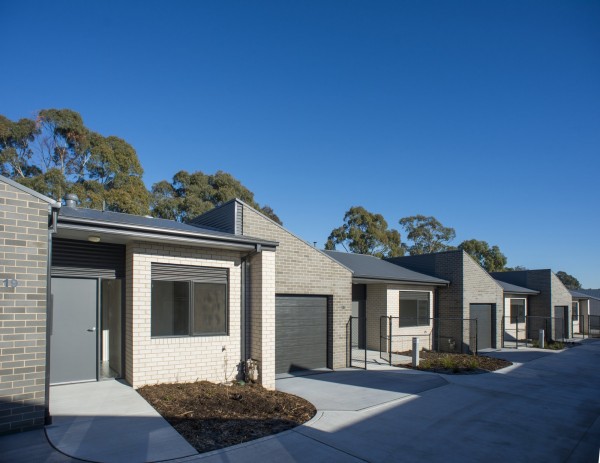
New public housing stock in the ACT. Photo: ACT Public Housing Renewal Taskforce.
The ACT Government now requires all dog owners in the ACT to register their pets annually, although at no extra cost. The law is intended to reduce dog attacks, re-home lost dogs, enforce laws and keep track of how many dogs there are in the ACT.
The government believes the current lifetime registration scheme does not accurately count the number of dogs in the ACT and does not provide up-to-date details of dog owners for law enforcement and rehoming purposes.
It appears readers are evenly divided on the proposal. We asked Should we register dogs annually? A total of 1,146 readers responded.
Your choices were to vote No, it’s unnecessary overkill that doesn’t meet any real need. This received 52 per cent of the total, or 601 votes. Alternatively, you could vote Yes, it’s a sensible idea that ensures animal welfare. This received 48 per cent of the total, or 545 votes.
This week, we’re wondering what you think about ACT Housing’s tenant policies.
Former Barnardo’s mother of the year and mum of seven, Belinda Nunn, has five daughters between six and 18, but has also helped raise her two nephews to her twin sister who died when the boys were young. She will be homeless within weeks after being told by Housing ACT there were simply no homes available.
“We need at least a four-bedroom home and I was told I was being put on a priority list, but I also heard there were 19 others on that list too,” Ms Nunn said.
With a vacancy rate of just 0.7 per cent and only about 500 properties available to rent in the ACT, the competition for an apartment is intense enough, let alone a house, especially one with four bedrooms or more. Ms Nunn is on a priority list of 19.
The ACT Government says the need for large houses represents a relatively minor part of the public housing market, and it intends to meet that need within the 10-year Housing Strategy released in 2018.
But Ms Nunn says that some of ACT Housing’s larger houses are already occupied by single tenants or couples whose children have grown up and moved on.
Candace Driscoll wrote: “I don’t understand how people can live in ACT housing for 20+ years. It should be temp until you can afford private housing. The whole system needs an update.”
Ol L said it was “unbelievable that a single person can stay in a family home indefinitely. Shame on you, ACT Housing”.
But Claire Eljay noted, “there’s a huge gap between rent-controlled social housing and paying for private rental though. So unless the household doubles their income or more, moving from social housing to private is a pretty huge financial change they wouldn’t be able to afford, like 25% income on rent going up to 50-60% or more. It’s no wonder some households are there a long time when there’s nothing low cost in the private market”.
Our question this week is:




















